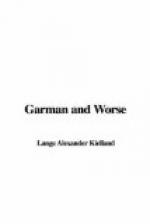Some one came skirting along the wall; it was the schoolmaster, Aalbom. He recognized Gabriel, and stopped. “Isn’t it what I always said?” cried he, triumphantly. “You are a regular Laban, standing here blubbering. You might at any rate manage to lend a hand with the water, you lout!”
Gabriel sprang up, as if seized with a sudden inspiration, pushed the master aside, and dashed down towards the building-yard.
“An ill-mannered cub,” muttered Aalbom, as he continued his way to get a good place from which to see the fire.
Rachel was naturally most anxious to make herself useful, but there was nothing for her to do. She therefore stood on the steps in front of the house, and watched the crowd streaming up from the town, while the fire threw its ever-increasing glare down the highroad, which was now thronged with people. Suddenly she heard a voice she recognized. “Out of the way! Let the engines pass! Look out there—the engines! Out of the way!” The crowd opened, and out of the throng came two rows of men, dragging the red-painted fire-engine by a long rope. Jacob Worse was running in front, shouting and giving his orders. He gave her a hurried greeting as he passed, and away rumbled the engine towards the ship-yard. It struck Rachel that his face was the only one that showed any feeling of sympathy or sorrow; all the rest appeared indifferent, and some showed, openly enough, that they thought the fire glorious sport. Rachel turned away and went into the house.
All this time the young Consul was standing at the corner window, on the north side of the small sitting-room. The pitch-house was now blazing inside; the flames came bursting out of the door, and followed the line of melted pitch which flowed along the ground. The thick wooden walls were glowing with the heat, and he could see the people shrink back when they got too near them. The wind was blowing so strongly, that it beat down the smoke and shrouded the engines and spectators from his view, but upon the roof of the storehouse he could see Uncle Richard, in company with some other forms, working away with the wet sail. The storehouse was only a few yards distant from the pitch-house, and was thus so close under the stern of the ship that she was as good as lost, if the fire once happened to catch the former building.
The Consul could see that they had got the sail drawn over the roof; but at that instant the tiled roof of the pitch-house fell in, and the flames suddenly shot high into the air, and were borne by the wind right down on to the storehouse. The attache, and those that were with him, had to get down from the roof on the other side as best they might.
A step was heard running up the stairs and through the passage.
“Father! father!” It was Morten, who dashed in breathless and dripping. “Father, we must have some powder; the storehouse must be blown up!”
“Nonsense!” answered the Consul, drily. “Why, it is right under the very stern of the ship.”




